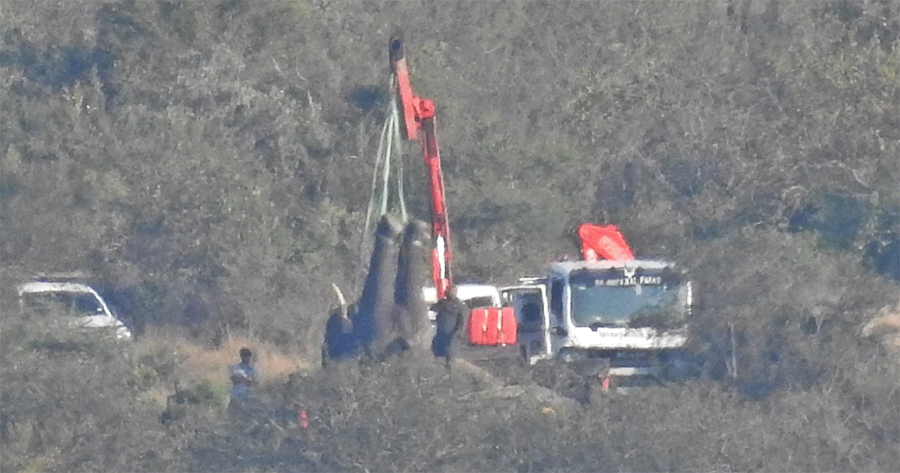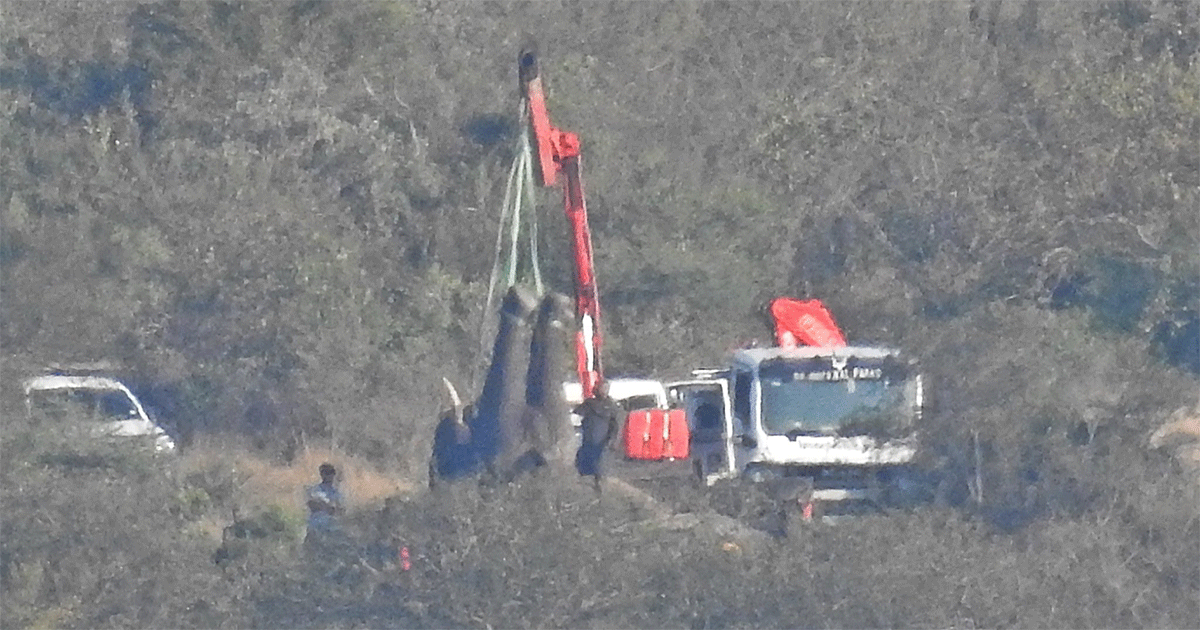
PHOTOS: Relocating Elephants that Trekked 700km from Mozambique to Get to Kruger National Park
Yesterday was very exciting, writes Bron Kotze, owner of Mlondozi Self-catering Chalet in Malelane, near the Kruger border. After having followed the news on the Elephants Alive Facebook page, of a group of elephants that were making their way north from Mozambique (over 700kms!), I was delighted to hear yesterday morning that they had reached […]

Yesterday was very exciting, writes Bron Kotze, owner of Mlondozi Self-catering Chalet in Malelane, near the Kruger border. After having followed the news on the Elephants Alive Facebook page, of a group of elephants that were making their way north from Mozambique (over 700kms!), I was delighted to hear yesterday morning that they had reached the southern border fence of the Kruger Park!
Whilst doing our usual brisk morning walk along a stretch of the Parks’ boundary fence (which admittedly, was probably more brisk than usual, with the thought of some ellies in the area!), we happened to see a huge fleet of large mammal relocation trucks, as well as cranes, tractors and several SANParks vehicles, all exiting the Park at Malelane Gate.

I could only assume, and hope, that they were on their way to attend to the ellies. By lunchtime, my curiosity got the better of me, and I went into Kruger, with the aim of driving along the S25, which runs parallel to Kruger’s southern boundary fence, and affords good views of Riverside Farm, which incorporates both areas of sugar cane, and stretches of natural bushveld.
The herd initially comprised of 10 ellies, and the leading bull, nicknamed Trail Blazer, has a collar, which has allowed for his movements to be tracked.
Unfortunately, by yesterday, the group had split up – Trail Blazer seemed nearest to Kruger’s fence, trying to find a way in. One male was injured, but not visible, and the other ellies were spread out between 3 properties.
Based on the GPS maps provided, Trail Blazer should still have been in that area. An update then came through at about 3pm stating that the team had already captured 4 ellies, and were on their way back for more…
Upon entering the Park, the SANParks helicopter flew overhead, possibly on its way to the Malelane Section Ranger’s post (for re-fueling, I assumed). My excitement grew!!

Once on the S25 gravel road, I spotted the helicopter which was on it’s way back to the area in question, and I also caught sight of two of the large mammal relocation trucks moving through the farm.
My photos are of poor quality, but the distance was very challenging, and I was trying to capture the action which was at least 1 km away. The rest of the action is detailed below in my photos….????:










z

Follow Bron Kotze on Mlondozi Self-catering Chalet. See more of her elephant relocation photos here.
UPDATE ON THE WANDERING BULLS – by Elephants Alive
The journey never ends
? Trailblazer has been through more than most elephants would ever face in their lifetime. Why he and his 10 companions have chosen to walk close to 800km ever since he was collared on the 30th of March 2022 in Mozambique by our passionate partners (The Mozambique Wildlife Alliance), is something we urgently need to understand and has thus become our mission.
? As a group of young and adventurous bulls, they moved over 500km across the Mozambique landscape and 128km across eSwatini in a very directional manner towards South Africa (SA). In SA they pushed hard to head home to the Kruger National Park (KNP). On the 7th of May they entered SA in the early hours of the morning and travelled a further 100km north.
? The last leg of their journey has been the hardest as sadly they were shot at, soon after entering SA. This ordeal resulted in them splitting up temporarily, but after regrouping they continued with their northern trajectory. Upon nearing their destination, we got word of an injured bull who was desperately trying to keep up with the group. We immediately rallied an expert vet and wildlife pilot to be on standby to treat the bull as dusk started approaching.
? Again, the group had split into three. That night Trailblazer made the decision to continue the journey home on his own. He bravely tried four times to cross a densely populated residential area south of Mjejane. Miraculously he managed to head east to find KNP’s southern boundary at 4h00 in the morning where he paced the fence up and down until he was loaded onto a truck by KNP at 17h00 that same day (10 May). Sadly, he was the only bull able to find Kruger’s border, with the rest of the herd split between two different properties further south.
? KNP managed to load four of these bulls before Trailblazer joined them on the truck. Regarding the injured bull, a decision was made by the KNP veterinarian team and the provincial administration (Mpumalanga Tourism and Parks Agency) to have him euthanized. At dusk, the five loaded bulls were driven a 290km (straight line distance) to the north of Shingwedzi and were offloaded in the early hours of this morning close to the Mozambique border. The others are still out there somewhere trying to navigate a very fragmented conservation landscape.
MTPA Statement
The Mpumalanga Tourism and Parks Agency (MTPA), in partnership with SANParks today confirmed it has successfully captured and relocated five of the eleven elephants. “We are delighted that the elephants are safe and have been captured and relocated safely. Our Wildlife Management team will continue to monitor the situation on the ground and look out for the remaining elephants which are believed to be with the breeding herds,” said Mduduzi Vilakazi, Acting CEO of the MTPA. Read the full story about the Elephants’ Trek from Mozambique to the Kruger National Park
Follow Elephants Alive here: https://www.facebook.com/ElephantsAlive.SouthAfrica
